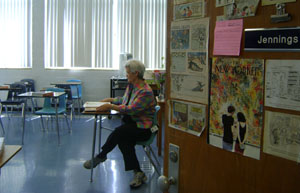

Merry Jennings is retiring at the end of the 2010 school year.
*** Published Monday, May 17 in the Bristol Herald Courier. ***
ABINGDON, VA -- Merry Jennings pulls out a pile of papers as she talks. On top of the stack is a buttered roll.
"I don't think students are asked often enough to think in different ways," she said. "These are concrete poems."
A concrete poem, she explains, is a poem that forms a picture or follows the contours of a shape suggested by the subject of the poem. The roll, still warm and missing a bite, was tattooed with a poem alluding to how delicious rolls are.
"My students said the boy who did that one did it over lunch period just before coming here. I think it's neat."
Jennings has been fostering this kind of creativity in her students for years at Abingdon High School, where she teaches honors English, AP English 12, works as the school's newspaper adviser, and compiles the school's creative writing booklet.
"I like to encourage students to be creative in any class I teach," she said. "Teaching should be about encouraging creativity."
It's this philosophy that Jennings has carried in her years of teaching. According to her, her students tend to tackle assignments with much more enthusiasm when they're asked to pull from their right brain rather than simply recite facts or memorize data. She says the kids even have more appreciation for their work when she takes this route.
"With creativity, they achieve more than they thought they could," she said. "If they only regurgitate what's drilled into them, it's not fun. As a teacher, it's much less so for me than them."
In her English classes, Jennings will get her students talking about images. She'll try to pull the information of what an image is and help them understand how it works. Then she'll just ask them to do it. Write an image. Be creative.
And competitive for that matter.
A case in point, the creative writing booklet. It isn't just art for arts sake. These stories, poems and plays go on to compete with high schools all across the state. Jennings said her students typically place someone in the top six and have had a number of first-place wins.
Jennings said it sometimes takes a few pushes, but the creativity is there. But so often, especially in English and literature, it comes out in many different forms and levels of quality.
"English is a collection of a lot of different skills as well as content," she said. "One may be a great writer of plays and another may be a great poet. There is no particular profile and it's hard to judge what is a good poem or play. What I think is good a judge on the state level may not."
Another thing Jennings said she like to foster is a love of learning. Once that is instilled in a young mind, the rest of their lives will be fruitful.
"It's hard to remember something for the rest of your life if it's not something you want to learn," she said.
To this end, she wants students to want to learn, be lifelong students of the world.
In class, Jennings said the true goal is to prepare her students for standardized tests. But in doing that, she finds a way to push the preparation a little further than the realm of the testing points.
"We're told what we need to do is get them prepared for the SOL's. The way I do it, I feel like they're prepared for college," she said.
Many of Jennings' students essentially have the free credits to skip their senior year of high school and start taking college freshman level courses. In many cases, they're going through Jennings for their education. And she hopes to make them love to learn.
"I want them to love literature and writing," she said. "I'm proud of all my students who have gone on to get their doctorates and teach, even those that got their GEDs"
And like any great teacher-student relationship, there comes a time when the teacher must pass the torch to the next generation.
For Jennings, that time is well on her.
She's retiring at the end of the school year. She said she'll stick around one more year as a "retirement year," but after that she'll be done.
"Right now I work about 14 hours a day, six days a week and I routinely have homework every night. It's very demanding," she said.
While she said she'll miss the interaction with her classes and the sense of learning going on, with all the things she has on her plate she said it'd be nice too to relax for a while.